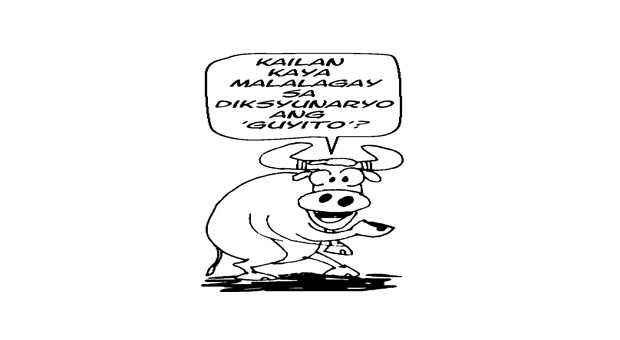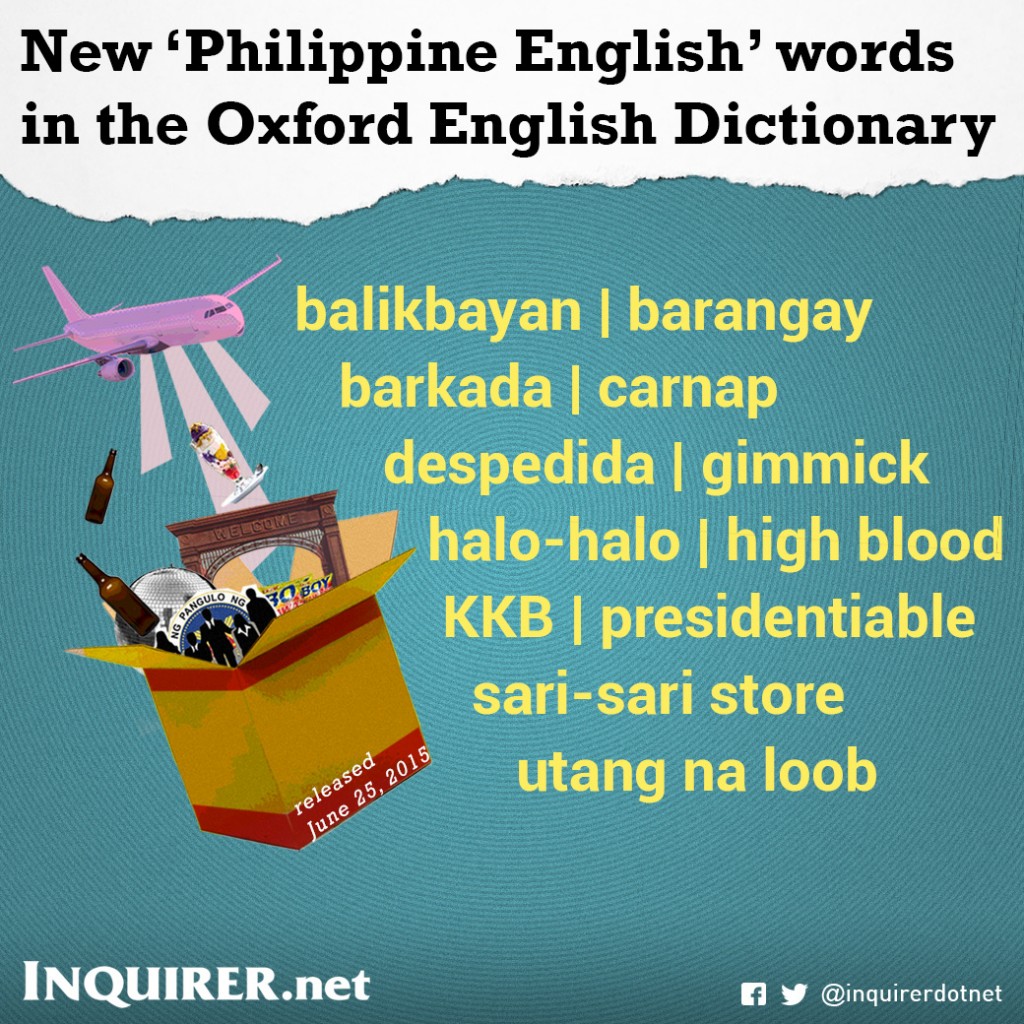40 Filipino-coined words now in Oxford dictionary
Careful about your language? Come on, don’t be “high blood.”
It’s now perfectly correct English to say that a “presidentiable” will stamp out “carnap” and “salvage” incidents, or that your “barkada” will go on a “gimmick” as long as it’s “KKB.”
The Oxford English Dictionary (OED) has included 40 Filipino terms—compound words and uniquely Philippine usage of English words—in the June 2015 update of what is recognized as the “definitive record of the English language.”
In a news release, the OED said the dictionary’s latest update “sees the inclusion of a number of words from Philippine English as part of our ongoing commitment to recording words from all varieties of English, throughout the world.”
It was the “largest single batch” of words from Philippine English to be recognized and “published at the same time” in the dictionary, said Danica Salazar, a Filipino lexicographer based in the United Kingdom, who works as Consultant Editor for the OED.
Article continues after this advertisementFirst time
Article continues after this advertisementThursday’s announcement was also the first time for OED to use the term “Philippine English” as a label for the Filipino variety of English usage, or “those that, according to our evidence, are chiefly or exclusively used by Filipinos or in the Philippines,” Salazar said.
The OED said in its news release that the selected words were found to be also in use “in parts of the United States that have large Filipino populations.”
“In this particular batch of Philippine English words, we made sure to have a balanced selection of items that show all the ways in which Filipinos have adapted the English vocabulary to suit their communicative needs,” Salazar said from Oxford in an e-mail interview with the Inquirer.
Salazar said the selection of Filipino words includes borrowed terms from Tagalog, like “halo-
halo,” “barangay” and “suki,” hybrid expressions like “balikbayan,” “sari-sari store” and “kikay kit,” and derivations like “presidentiable.”
Legitimizing Philippine English
Also included were compound words like “batchmate,” so-called blends of clipped words like “mani-pedi” or “manicure-pedicure,” initialisms like KKB or “kaniya-kaniyang bayad,” Filipinized translations like “go down” to mean “get off a vehicle,” conversions of nouns into adjectives, such as “high blood” to mean “angry, agitated,” and “complete changes” of word denotations, such as “gimmick” to mean a night out with friends and “salvage,” which means “to kill” instead of “to save” in the Philippines.
The addition of Philippine terms in the lexicon lends itself to the “legitimization of Philippine English as a variety in its own right,” said Salazar.
Along with Filipino, English is an official language in the Philippines, used in the academe, business, government and daily life. The country has also become a prime hub for English-language call centers.
“The inclusion of Philippine English words … is an acknowledgment that this particular variety is as worthy of serious linguistic scholarship as older, more established varieties, such as British and American English,” she said.
Innovations, not aberrations
Philippine English has long been present in the OED, with the word “abaca” included in the dictionary’s first edition in 1928. The words “Pinoy” and “adobo” were added in 2006.
Salazar said OED’s recognition of Philippine terms may also uplift the lot of the Filipino variety of
English as it gives legitimacy to usage previously frowned upon, such as “carnap” and “salvage.”
“Becoming part of the OED is a recognition of the role that Philippine English plays in the evolution of the language. Such recognition may also lead to the realization among Filipinos that the liberties we take with English are not aberrations, but rather linguistic innovations that reflect our own cultural experience and contribute to the richness of English,” Salazar said.
Inquirer ‘a good source’
The terms were selected through the Oxford University Press’ resources “to track the emergence of new words and senses,” including the Oxford English Corpus.
The research also included referencing “studies of Philippine English by Filipino and foreign linguists, and also from my own observations as a native speaker of the variety,” Salazar said.
Filipino publications, such as the Philippine Daily Inquirer, were also used as a source for word suggestions.
“The Inquirer is actually a good source of illustrative quotations for the OED, meaning that your newspaper is actually in the dictionary,” Salazar said.
As examples, she cited the newspaper’s use of the terms “baro’t saya,” “batchmate,” “estafa” and “gimmick” in its news stories.
500 new words
The Philippine terms were among 500 new words, 900 newly revised and updated words, and 2,400 new senses (or definitions) of existing words.
Salazar said the inclusion of the Philippine terms “benefits both the dictionary and the Philippine variety of English itself.”
“English has gone beyond the countries where it is spoken as the sole native language, and has spread to many different parts of the globe, where it is used for intra- and international communication along with a number of other local languages.”
“As a dictionary that considers itself the ultimate historical record of the English language, the OED … is keen to, include more and more words from these World Englishes. Philippine English is just one of these vibrant new varieties of the language that make English a truly global tongue,” she said.
‘Kilig’ may be next
Before her employment at OED in December 2014, the 31-year-old Salazar worked on a research piece on “improving the representation of Philippine English” in the Oxford Dictionary.
Many more are on the pipeline as Salazar continues to work on the Oxford Dictionary.
“The idea that I am contributing my own knowledge and work on World Englishes, and Philippine English in particular, and that this work will, many years from now, continue to be used by a new generation of lexicographers that are keeping the OED current and useful for a new generation of users, that just gives me a real sense of purpose,” she said.
“This means that Philippine English will continue to be represented in the dictionary—I really cannot ask for anything more as a legacy.”
She said the word “kilig”—that tingly romantic feeling hard to capture in a singular English term—may be next.
Word for gyrating
One “new” word—“twerk”—dates back to 1820, the Oxford English Dictionary said.
The word rocketed into popular use following US singer Miley Cyrus’ controversial gyrating at a music awards performance in 2013.
Research by the OED found “twirk” was first used as a noun in 1820, referring to a “twisting or jerking movement.” The verb is believed to have emerged later in 1848, with the “twerk” spelling popularly used by 1901.
“We are confident that it is the same origins as the dance. There has been constant use up into the present day to mean that same thing,” said
Described as dancing “in a sexually provocative manner, using thrusting movements of the bottom and hips while in a low, squatting stance,” twerking has its modern roots in the early 1990s New Orleans “bounce” music scene.
10 years of usage
Webisode, e-cigarette and twitterati are among the other words entering the OED.
For a word to qualify, it must have been in common use for at least 10 years in both newspapers and novels.
OED senior editor Fiona McPherson said all the new entries had “earned their place” in the history of the English language.
An e-cigarette is described as a “cigarette-shaped device containing a nicotine-based liquid or other substance that is vaporized and inhaled, used to simulate the experience of smoking.”
Twitterati, describing users of the social media service, has also been added to the dictionary.
Another new entry is Flotus, an acronym for the first lady of the United States which was used as early as 1983, and is now Michelle Obama’s official twitter handle. With a report from AFP
RELATED STORY

